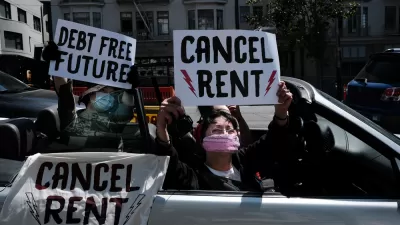The ups and downs of the pandemic have been extremely hard to predict, so the consequences of the pandemic have been just as unforeseeable—despite the efforts of a nation of armchair prognosticators.

Writing for the Atlantic, Jerusalem Demsas evaluates some of the most prominent "failed projections" of the pandemic, including two of particular relevance to the field of planning: the expected but not (yet) realized "eviction tsunami" and the for a potential "housing market crash."
Demsas sums up the projections of eviction demise and the actual results thusly:
In August 2020, the Aspen Institute released a report warning that 30 million to 40 million people in the United States were at risk of eviction, a number equivalent to roughly one in 10 Americans. But in December 2021, Princeton’s Eviction Lab found that in the 31 cities where it had collected data, all but one recorded fewer eviction filings than the historical average. Not only was the prediction startlingly off base—evictions actually declined.
Planetizen was closing watching the potential for a wave of evictions from the beginning of the pandemic, documenting news and articles under the "Eviction Crisis" tag—including an article titled "Rent Crisis Deferred" by the author of this Planetizen post.
As for the expected housing market crash:
Basically no one predicted the gangbusters housing market. Some economists thought home-price growth would flatten, and others thought the recession could tank the market. Businesses were pessimistic too: Opendoor, a company that buys and sells homes online, sold off roughly $1 billion worth of inventory in 2020 and paused its purchasing for several months, leading to significant losses. We now know that home prices have risen dramatically throughout the pandemic.
Planetizen has also been tracking the trajectory of the housing market under various tags, such as "Housing Affordability Crisis," "Housing Crisis," and "Real Estate Market." The housing market is making almost daily news—but never for crashing.
Demsas is less concerned with debunking these failed projections as explaining why so many projections failed, so the majority of the article is dedicated to listing four causes for these failures: 1) Fighting the last war, 2) Data overload, 3) Bias, and 4) Underestimating resilience.
To be clear, many advocates aren't ready to declare concerns about an "eviction tsunami" a failed projection. With eviction moratoria still in place in many parts of the country, economic relief packages expiring, rent caps in place in cities like Los Angeles, and reports of increasing eviction proceedings overwhelming the legal system in New York City, the worst could still be yet to come.
The source article, linked below, includes a lot more detail on each of the four causes of failed pandemic projections as well as a conclusion that explains why these failures matter: "In a crisis, credibility is extremely important to garnering policy change. And failed predictions may contribute to an unhealthy skepticism that much of the population has developed toward expertise."
FULL STORY: Why So Many COVID Predictions Were Wrong

Planetizen Federal Action Tracker
A weekly monitor of how Trump’s orders and actions are impacting planners and planning in America.

Maui's Vacation Rental Debate Turns Ugly
Verbal attacks, misinformation campaigns and fistfights plague a high-stakes debate to convert thousands of vacation rentals into long-term housing.

Restaurant Patios Were a Pandemic Win — Why Were They so Hard to Keep?
Social distancing requirements and changes in travel patterns prompted cities to pilot new uses for street and sidewalk space. Then it got complicated.

In California Battle of Housing vs. Environment, Housing Just Won
A new state law significantly limits the power of CEQA, an environmental review law that served as a powerful tool for blocking new development.

Boulder Eliminates Parking Minimums Citywide
Officials estimate the cost of building a single underground parking space at up to $100,000.

Orange County, Florida Adopts Largest US “Sprawl Repair” Code
The ‘Orange Code’ seeks to rectify decades of sprawl-inducing, car-oriented development.
Urban Design for Planners 1: Software Tools
This six-course series explores essential urban design concepts using open source software and equips planners with the tools they need to participate fully in the urban design process.
Planning for Universal Design
Learn the tools for implementing Universal Design in planning regulations.
Heyer Gruel & Associates PA
JM Goldson LLC
Custer County Colorado
City of Camden Redevelopment Agency
City of Astoria
Transportation Research & Education Center (TREC) at Portland State University
Jefferson Parish Government
Camden Redevelopment Agency
City of Claremont





























